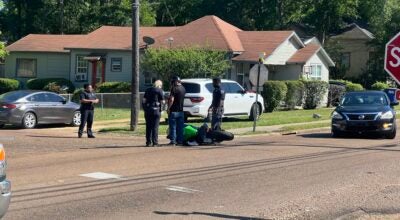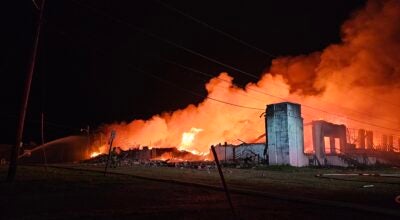What role did mental health, domestic violence play in tragedy?
Published 8:31 am Friday, June 2, 2017
When tragedy happens, people ask why.
In the aftermath of the violence in Lincoln County over Memorial Day weekend, people are asking questions about the mental stability of the alleged shooter, Willie Cory Godbolt.
No official statements have been issued on Godbolt’s mental health.
Pastor Philip Sterling, who has known Godbolt since he was a young boy, said the man appears to have suffered a “deep emotional mental breakdown that should have been addressed a long time ago.”
Sterling, pastor of Grace Community Church, said the shootings are making people wonder if it could have been prevented and could it happen again.
“It’s something that’s making everyone think what do we do about mental illness,” Sterling said. “Mental illness is real. There could very well be another Cory out there, just planning.”
When a person who is believed to suffer from any type of mental illness commits an act of violence, victims, families of victims and outside observers are often left wondering not only why the violence took place, but also if warning signs surfaced that could have been — and should have been — addressed.
The other question that arises is whether the legal system could have done something more or something different.
Significant studies into the links between mental health problems and violence have consistently determined that the majority of people with mental illness are not violent and only 3 to 5 percent of violent acts can be attributed to individuals with serious mental illness. But in those rare cases, are there warning signs? Absolutely so, says Region 8 Director of Children’s Services Richard McMullan.
The signs can appear at any point in a person’s life span, increasingly in teen years, but also in childhood.
“The best predictor — in terms of research to predict violent behavior through warning signs — is a past history of violent behavior,” said McMullan, who has been working in mental health services with adults and children for 26 years.
The behaviors may be well known throughout the community or only by those who best know the individual.
“Their knowledge of that person’s past history is critical,” McMullan said, “and it is certainly critical for them not to discount it.”
Family members, friends, co-workers or other acquaintances who have noted verbal or physical threats to themselves or others should take them seriously. Many times threats of violence toward others is predicated by or goes along with threats of self-harm, as well. Whether the threats are direct or veiled, verbal or physical, they are often ignored, but certainly shouldn’t be, McMullan warned.
McMullan said that this type of behavior can happen unexpectedly, but generally has been building in intensity for some time, over many years. One warning sign that a person may need some type of help is a pattern of blaming others for all their disappointments and mishaps, not taking any self-responsibility for anything negative that happens in their lives.
McMullan said that additional stress in a person’s life, as well as substance abuse, can lower stress thresholds and may lead a person to act on previous threats.
Someone who is making an explicit threat of violence shouldn’t be approached by another person who does not know them, McMullan said, but witnesses to the behavior can call authorities or family members, even anonymously.
“People can contact us at any hour,” McMullan said. “When they do, usually they have already talked to a trusted confidant like a family member or pastor.” Sometimes the person who is making threats is willing to talk with someone who is trained to offer mental health services, he said, and is compassionate toward them.
The budget for the Mississippi Department of Mental Health suffered cuts of approximately $4.8 million for the budget that takes effect July 1. Department spokesman Adam Moore said this would result in actual reductions of nearly $8 million due to programs and personnel that would need to be cut or done away with because of the budget changes.
Though healthcare options may be limited, they are still available through groups like Region 8. Qualified counselors can be contacted through Region 8 by calling 877-657-4098.
Hindsight is always 20-20, as the saying goes, but even with warning signs and previous incidents of actual or threatened abuse, the legal system can only do so much.
Marion County District Attorney Hal Kittrell said his office and other agencies are shackled to just what’s been reported by victims, but when a case of abuse, specifically domestic, reaches his office everything that can be done to keep it from reoccurring is done.
Godbolt’s character began to change after his father was killed, Sterling, a former police officer, believes. Godbolt began a series of run-ins with the law. He was repeatedly cited for threatening or assaulting others, including family members, and his wife obtained a restraining order against him in June 2016.
“We are in constant contact with the victims,” said Kittrell. One of the first things his office does is ask for misdemeanor and felony histories, he said.
“We make sure that any prior order is enforced,” Kittrell said. “Lower courts and law enforcement officers have to follow through on enforcing restraining orders or convictions, and they typically do this very well.”
The real problem, he said, is that once violence has occurred it is going to reoccur. A lot of times victims will not call for help because they fear it will escalate the situation, or they will ask for charges to be dropped after an arrest, often under pressure from the abuser.
An officer of the law can only file an affidavit without a victim’s consent if that officer witnesses the incident, Kittrell said. The lone exception is in the case of domestic violence. If an officer has reason to believe that domestic violence has taken place, they can place the accused under arrest.
Unfortunately, said Kittrell, domestic violence will continue until at some point someone steps in.
“You can get all the restraining orders you want,” he said, “but you’re still going to have to make that 911 call. You have to protect yourself and your family.”
“No piece of paper is going to keep someone away who wants to cause harm,” Kittrell said.





